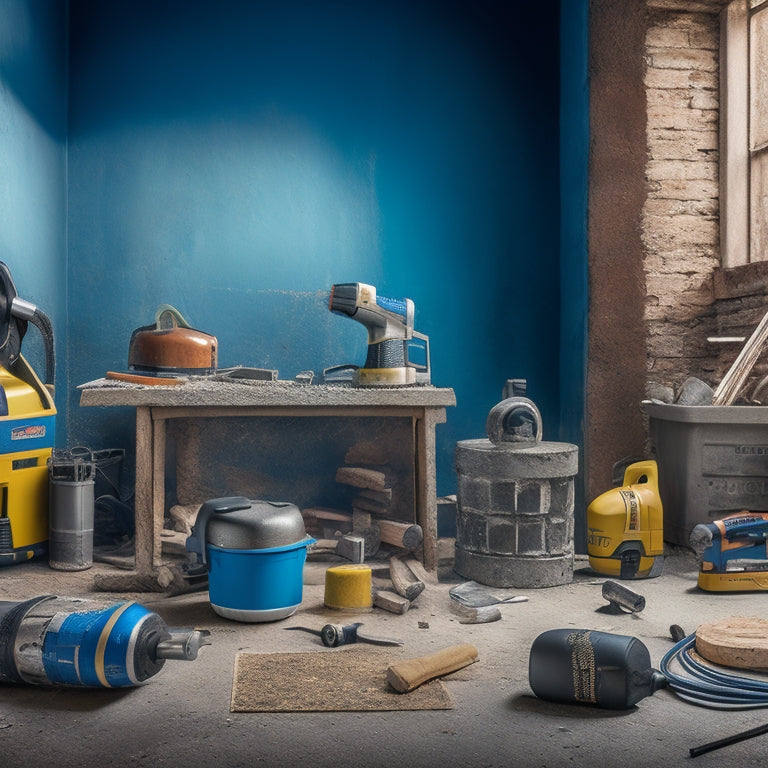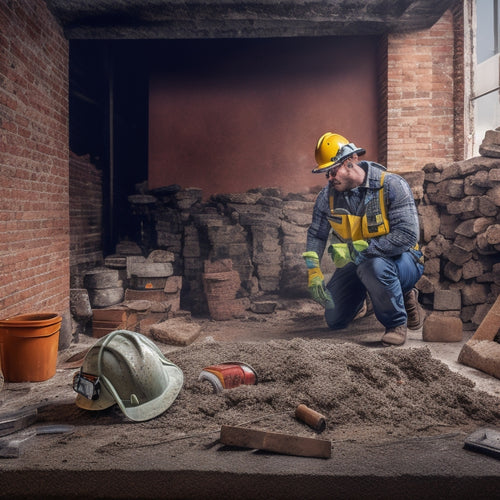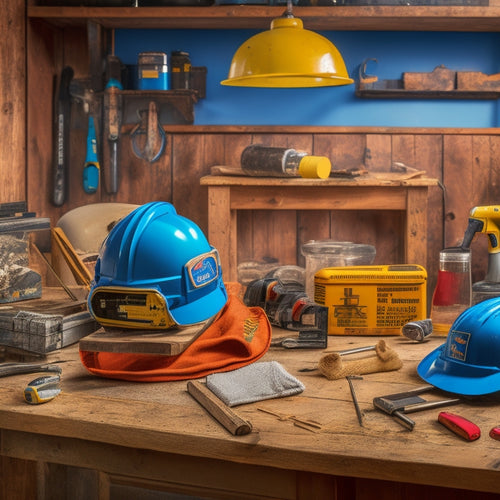
What's the Best Portable Mixer for Home Renovations
Share
You're looking for a portable mixer that can handle the demands of your home renovation projects, and reliability is key - a mixer that can consistently deliver high-quality mixes of concrete, mortar, and paint without breaking down under the pressure. When choosing the best portable mixer, consider factors like high torque motors, sturdy construction, and adjustable speed controls to guarantee maximum output and minimal energy use. Top brands like Makita, Bosch, and DeWalt offer durable and performance-driven options. As you explore the features that matter most to your projects, you'll find the perfect mixer to get the job done efficiently and effectively.
Key Takeaways
• Consider reliable brands like Makita, Bosch, and DeWalt for durable and high-performance portable mixers suitable for home renovations.
• Look for key features such as high torque motors, adjustable speed controls, and ergonomic designs for ease of use on job sites.
• Choose a mixer with a suitable drum size and material capacity based on project needs, with 1-2 cubic feet recommended for small projects.
• Electric mixers are suitable for indoor use and are quieter, while gas-powered mixers offer flexibility for remote areas and heavy-duty projects.
• Evaluate power output, motor type, and features to find a budget-friendly option that meets your specific project requirements.
Top Portable Mixers for Homeowners
When tackling home renovation projects, you need a reliable portable mixer that can efficiently mix and blend various materials, such as concrete, mortar, and paint. With numerous options available, selecting the right mixer can be overwhelming. That's why it's crucial to conduct a mixer brands comparison to identify the top performers.
Start by researching user reviews insights to get a sense of each mixer's strengths and weaknesses. Look for mixers with high torque motors, sturdy construction, and adjustable speed controls. These features will enable you to tackle demanding mixing tasks with ease. Some top brands to evaluate include Makita, Bosch, and DeWalt, which are known for their durability and performance.
When comparing mixers, pay attention to their capacity, weight, and ergonomics. A mixer that's too heavy or cumbersome can be a hindrance on the job site. Additionally, assess the type of materials you'll be mixing most frequently and choose a mixer that's optimized for those tasks.
Best Concrete Mixer for Small Projects
For small concrete projects, such as patching a sidewalk or building a small patio, you'll want a mixer that's compact, lightweight, and easy to maneuver. This will allow you to work efficiently in tight spaces without sacrificing performance.
When it comes to small project considerations, you'll want to focus on concrete mixing techniques that guarantee a consistent and strong finish.
Here are some key features to look for in a concrete mixer for small projects:
-
A drum capacity of 1-2 cubic feet to handle small batches of concrete
-
A robust motor that can handle heavy mixing demands
-
A compact design that fits through narrow doorways and stairwells
- A durable construction that can withstand the rigors of frequent use
Premixed Concrete Mixing Essentials
What're the essential mixing techniques you need to master to achieve a consistent, high-quality finish with premixed concrete? To access the premixed concrete advantages, you must understand the importance of proper mixing.
Start by following the manufacturer's instructions for mixing ratios and water addition. Then, guarantee your mixing area is clean, dry, and free from contaminants.
Next, add the recommended amount of water to the mixer, followed by the premixed concrete. Mix the contents for the specified time, usually around 3-5 minutes, until you achieve a uniform consistency. Avoid overmixing, as this can lead to a weakened final product.
Once mixed, use the concrete within the recommended timeframe to guarantee peak results. Proper mixing techniques will help you achieve a smooth, even finish that's resistant to cracks and defects.
Portable Mixer Power and Performance
With your premixed concrete properly mixed, you're now ready to reflect on the power and performance of your portable mixer, which will greatly impact the efficiency and quality of your home renovation project.
A mixer's power and performance are critical factors to take into account, as they directly affect the speed and quality of your mixing process.
When evaluating a portable mixer's power and performance, think about the following key factors:
-
Mixer Torque Ratings: Look for a mixer with high torque ratings, as this indicates its ability to handle thick, heavy mixes with ease.
-
Power Efficiency: Opt for a mixer with a high power-to-weight ratio, guaranteeing maximum power output while minimizing energy consumption.
-
Motor Speed: A mixer with variable speed control allows you to adjust the mixing pace to suit your specific project needs.
- Overload Protection: Make sure your mixer has built-in overload protection to prevent motor burnout and extend its lifespan.
Drum Size and Material Capacity
When selecting a portable mixer for your home renovation project, you'll need to take into account the drum's volume limits and material holding capacity.
You'll want to make sure the mixer can handle the quantity of material required for your specific task, whether it's mixing mortar, concrete, or drywall compound.
Drum Volume Limits
You'll need to evaluate the drum volume limits of your portable mixer, as they directly impact the amount of material you can process in a single batch, and the size of the drum determines the capacity. This is essential because it affects your mixing efficiency and overall productivity.
A larger drum capacity can process more material at once, but it may also increase the mixer's weight and size, making it less portable.
When evaluating drum volume limits, consider the following factors:
-
Drum size: A larger drum means higher capacity, but also increased weight and size.
-
Material density: Thicker materials require more space, while lighter materials can be processed in smaller drums.
-
Batch size: Determine how much material you need to process in a single batch to optimize your mixing efficiency.
- Drum shape: A well-designed drum shape can maximize capacity while minimizing size and weight.
Material Holding Capacity
The material holding capacity of your portable mixer, measured regarding drum size and material capacity, directly impacts the efficiency of your mixing process, as it determines how much material you can process in a single batch. This capacity is essential, especially when working on large-scale projects or mixing materials with varying consistencies.
When selecting a portable mixer, consider the drum size and material capacity that suits your specific needs. A larger drum size may be ideal for mixing large quantities of material, but it may also increase the weight and size of the mixer, making it less portable.
Here's a comparison of some popular portable mixers:
| Drum Size (Gal) | Material Capacity (Lbs) |
|---|---|
| 5 | 200-250 |
| 7 | 300-350 |
| 10 | 450-500 |
| 12 | 550-600 |
Keep in mind that your mixing technique and material compatibility also play a significant role in determining the best material holding capacity for your project. By choosing the right portable mixer with the suitable drum size and material capacity, you'll be able to work efficiently and effectively, ensuring a successful home renovation.
Mixer Weight and Portability Factors
When you're shopping for a portable mixer, you'll want to evaluate the weight and size of the unit, as these factors will directly impact its portability.
You'll need to think about how easily you can lift and maneuver the mixer, especially if you're working on a multi-story renovation project.
Mixer Size Matters
Size greatly impacts your mixer's usability, as heavier models can fatigue your arms and shoulders, making it vital to balance power with portability.
When choosing a portable mixer, it's important to take into account the ideal mixer size for your needs. A mixer that's too large can be cumbersome, while one that's too small may lack the necessary power.
Here are some factors to think about when evaluating mixer size:
-
Mixer dimensions impact: Measure the space where you'll be using the mixer to confirm it fits comfortably. Reflect on the mixer's height, width, and depth to avoid any clearance issues.
-
Ideal mixer size: Look for a mixer with a compact design that still provides adequate mixing capacity. A smaller mixer may be suitable for smaller batches, while larger projects may require a more substantial mixer.
-
Ergonomic design: Opt for a mixer with an ergonomic design that allows for comfortable handling and reduced fatigue.
- Storage and transportation: Consider a mixer with a compact design that's easy to store and transport, making it perfect for home renovations.
Weight Distribution Counts
You'll want to balance mixer size with weight distribution to guarantee your portable mixer is easy to handle and doesn't compromise on power. A well-balanced mixer guarantees that the weight is evenly distributed, making it easier to transport and reducing the risk of accidents. Look for a mixer with a low center of gravity, which will prevent it from tipping over during transport or use.
When evaluating a portable mixer's weight distribution, consider the load distribution as well. A mixer with a well-designed load distribution system will guarantee that the weight is evenly spread across the wheels or handles, making it easier to push or pull. This is particularly important if you'll be working on uneven terrain or steering stairs.
A mixer with a poor weight balance can be difficult to control, putting you and others at risk. By prioritizing weight distribution, you'll be able to focus on getting the job done efficiently and safely.
Electric Vs Gas Powered Mixers
Selecting the right power source for your portable mixer is essential, as electric and gas-powered mixers cater to different needs and preferences in home renovation projects. You need to evaluate factors like mixer fuel efficiency, noise level, and convenience when deciding between the two.
Here are some key differences to keep in mind:
-
Electric mixers: They're ideal for indoor projects or areas with limited ventilation, as they produce no emissions. They're also quieter and require less maintenance than gas-powered mixers. However, they need a power source, which can limit their portability.
-
Gas-powered mixers: They offer more flexibility and can be used in remote areas without access to electricity. They're also more powerful, making them suitable for heavy-duty projects. However, they're noisier, produce emissions, and require regular mixer maintenance tips, such as oil changes and spark plug replacements.
Ultimately, the choice between electric and gas-powered mixers depends on your specific needs and the type of projects you're working on. By evaluating these factors, you can choose the right mixer for your home renovation projects.
Safety Features to Consider
When operating a portable mixer, especially in confined or hazardous environments, it's essential that you prioritize safety by looking for models equipped with important safety features. You should always wear safety gear, including gloves, safety glasses, and a dust mask, to protect yourself from flying debris and airborne contaminants.
Here are some key safety features to take into account:
| Feature | Description |
|---|---|
| Emergency Stop | A quick-stop mechanism that allows you to rapidly shut down the mixer in case of an emergency |
| Ground Fault Circuit Interrupter (GFCI) | A safety device that protects against electrical shock |
| Overload Protection | A feature that prevents the mixer from overheating or burning out due to excessive load |
Regular mixer maintenance is also important to guarantee safe operation. Make sure to follow the manufacturer's guidelines for maintenance, including cleaning and lubricating moving parts, and checking for worn or damaged components. By prioritizing safety and maintenance, you can minimize the risk of accidents and secure a successful home renovation project.
Budget-Friendly Mixer Options
With safety features and maintenance in mind, you can now focus on finding a portable mixer that fits your budget, as affordable options are available that still offer reliable performance and quality.
You don't have to break the bank to get a decent mixer for your home renovation projects.
Here are some budget-friendly mixer options to evaluate:
-
DeWalt's 9-Amp Mixer: A compact and lightweight option that's perfect for small to medium-sized projects, priced around $150.
-
Ryobi's 18V Mixer: A cordless mixer that's part of Ryobi's popular ONE+ line, offering excellent value for its price of around $100.
-
Bosch's 120V Mixer: A powerful and durable mixer that's designed for heavy-duty use, priced around $250.
- Makita's 12V Mixer: A high-torque mixer that's perfect for heavy mixing tasks, priced around $200.
When making budget comparisons, evaluate the mixer's power output, motor type, and additional features like LED lights or adjustable speed controls.
Frequently Asked Questions
Can I Use a Portable Mixer for Large-Scale Construction Projects?
When tackling large-scale construction projects, you'll want to evaluate whether a portable mixer can keep up with your demands.
While they're great for smaller tasks, you'll need to assess the mixer's capacity to guarantee it can handle the volume of materials required.
For maximum construction efficiency, you'll likely need a more heavy-duty solution, as portable mixers may not be able to keep pace with your project's needs.
Are Portable Mixers Suitable for Mixing Materials Other Than Concrete?
You're not limited to concrete with a portable mixer - it's a versatile tool that can tackle alternative materials with ease.
Think mortar, plaster, or even specialized coatings. The key lies in adapting your mixing techniques to the material at hand.
Experiment with different speeds, blade angles, and mixing times to find the perfect blend.
With practice, you'll be a master mixer, effortlessly combining materials to achieve professional-grade results.
Do Portable Mixers Come With a Warranty or Guarantee?
When purchasing a portable mixer, you'll want to investigate the warranty terms and product guarantees offered by the manufacturer.
Most reputable brands provide a warranty that covers defects and repairs for a specified period, usually 1-3 years.
Some may also offer extended warranties or maintenance plans.
Be sure to review the fine print, as warranty terms can vary considerably between brands and models.
Can I Rent a Portable Mixer Instead of Buying One?
As you weigh your options, consider renting a portable mixer as a temporary solution, symbolizing flexibility in your renovation journey.
You'll avoid the upfront cost, but be prepared for recurring rental costs that can add up.
Research mixer brands that offer rental options, like Bosch or DeWalt, to find the best fit for your project.
Calculate the total rental cost versus buying, and decide what's best for your budget and timeline.
Are Portable Mixers Suitable for Outdoor Use in Extreme Weather?
When working outdoors, you'll want a portable mixer that can withstand harsh weather conditions.
Look for models with weather resistance and outdoor durability features, such as waterproof coatings, sealed electrical components, and robust construction.
These will guarantee your mixer keeps performing in rain, snow, or extreme temperatures.
Don't settle for anything less, as a mixer that can't handle the elements will leave you stranded mid-project.
Conclusion
As you navigate the renovation landscape, your trusty portable mixer is the compass that charts a course through concrete jungles and drywall deserts.
With the right mixer by your side, you'll conquer projects with ease, mixing and matching your way to a beautifully renovated home.
So, choose wisely, and let your mixer be the steady beat that drives your renovation rhythm.
Related Posts
-

Crack Repair Inspection Checklist for Home Renovation
When creating a crack repair inspection checklist for your home renovation project, you'll want to identify crack typ...
-

7 Must-Have Safety Gears for Brick Wall Renovation
When renovating a brick wall, you'll face a multitude of hazards, making it essential to wear and use the right safet...
-

Top 3 Safety Essentials for DIY Renovations
When tackling a DIY renovation, you'll want to prioritize three essential safety items to protect yourself from poten...


